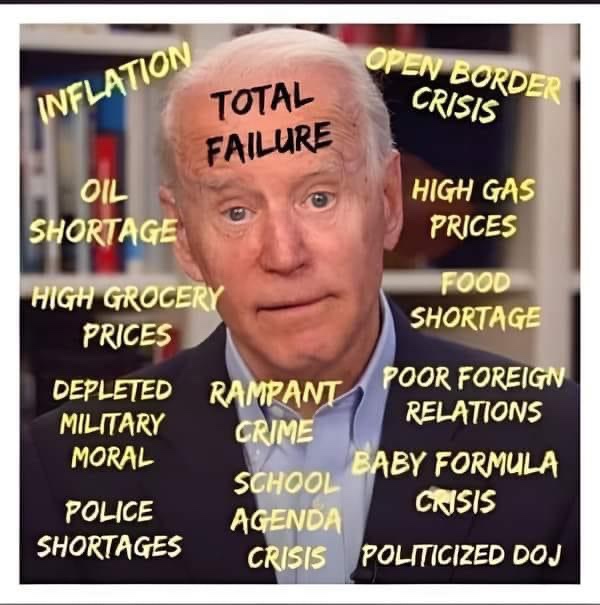Insane gas prices? Open border? Where should we begin? To many things wrong with the Biden admin to fit on one page..… but here we go…. Opinions on the effectiveness of a president can be highly subjective, often influenced by personal beliefs and political leanings. In this article, we undertake a critical assessment of Joe Biden’s presidency, evaluating his leadership and policy decisions. By examining key actions and their potential consequences, we aim to provide insights into different perspectives on his performance as President of the United States.

Economic Policies: Since taking office, the Biden administration has implemented several economic policies, most notably the American Rescue Plan and proposed infrastructure investments. Critics argue that while these policies aim to stimulate the economy and provide relief to individuals and businesses, concerns arise over their potential long-term effects. These concerns include increased national debt, inflation risks, and the impact on job growth and business competitiveness. Proponents, on the other hand, maintain that these investments are necessary for economic recovery and long-term growth, providing much-needed support to struggling Americans and creating sustainable infrastructure.
Immigration and Border Security: The administration’s approach to immigration and border security has garnered significant attention. Critics argue that policy changes and executive orders, such as halting border wall construction and implementing a more lenient approach to immigration enforcement, have raised concerns over border security, national sovereignty, and strain on public resources. Proponents argue that the administration’s focus on a more humane and comprehensive approach seeks to address root causes, improve immigration processes, and uphold America’s values as a nation of immigrants. They argue that a compassionate immigration system is essential for economic growth and inclusivity.
Energy and Environmental Policies: Under the Biden administration, rejoining the Paris Agreement and revoking the Keystone XL pipeline permit have been significant actions in the realm of energy and environmental policies. Critics express concerns over potential job losses in the energy sector, the impact on energy independence, and the balance between environmental protection and economic considerations. Proponents argue that these decisions prioritize global climate action, support the growth of renewable energy industries, and address the urgent need for environmental sustainability. They believe these policies will not only combat climate change but also create new job opportunities in clean energy sectors.
Foreign Policy and International Relations: The Biden administration has approached foreign policy with a focus on rebuilding alliances and engaging in multilateral cooperation. Critics argue that perceived weaknesses in dealing with adversaries, such as China and Russia, could compromise national security interests. Additionally, policy shifts, such as reevaluating military deployments and approaches to international trade agreements, raise concerns over potential implications. Proponents view these actions as attempts to restore diplomatic norms, strengthen alliances, and address global challenges collectively. They believe a collaborative approach will help restore America’s standing in the world and promote stability.
Second Amendment and Gun Control: The administration’s stance on Second Amendment rights and proposed gun control measures has sparked intense debate. Critics express concerns over potential infringements on constitutional rights, arguing that such measures may not effectively address the underlying causes of gun violence. Proponents argue that common-sense gun control measures are necessary for public safety and reducing gun violence. They aim to balance individual rights with responsible firearm regulations, such as background checks and closing loopholes, to prevent firearms from falling into the wrong hands.
Healthcare Policies: The administration has prioritized healthcare, including efforts to expand access and lower costs. Critics raise concerns over potential impacts on private insurance, the role of government in healthcare, and the long-term sustainability of proposed changes. Proponents argue that these policies aim to improve affordability and access to healthcare, particularly for vulnerable populations. They believe that a stronger government role can help address systemic issues within the healthcare system, such as high costs and disparities in coverage.
Criminal Justice Reform: The administration has shown commitment to criminal justice reform, advocating for sentencing reform and police accountability measures. Critics express concerns over potential impacts on public safety and rising crime rates, emphasizing the importance of maintaining law and order. Proponents argue that these reform efforts seek to address systemic inequities, promote fair and just sentencing, and improve trust between law enforcement and communities. They believe that a balanced approach can lead to a more equitable and effective criminal justice system.
Assessing a president’s performance requires a thorough analysis of their leadership and policy decisions. Opinions on Joe Biden’s presidency will naturally vary, and it is essential to consider diverse perspectives in order to gain a more comprehensive understanding. By critically examining key aspects of his presidency, we contribute to a broader and more informed discussion about his effectiveness as the President of the United States.
As an Amazon Associate we earn from qualifying purchases through some links in our articles.



